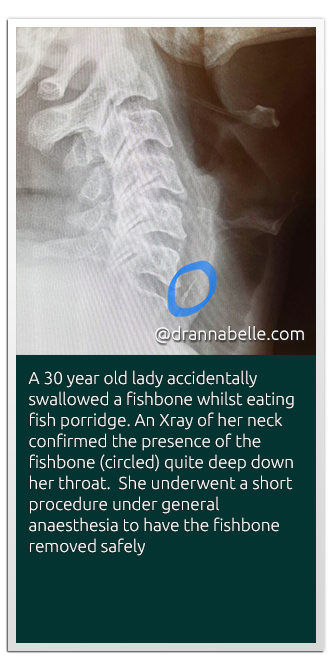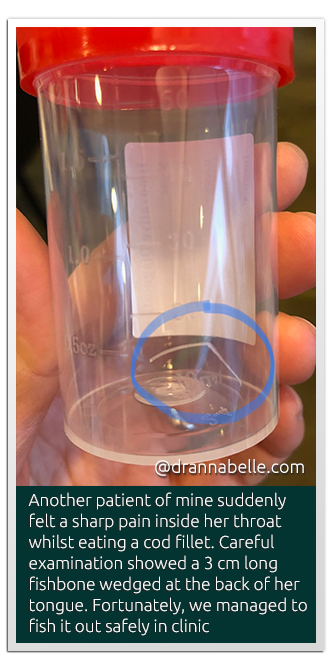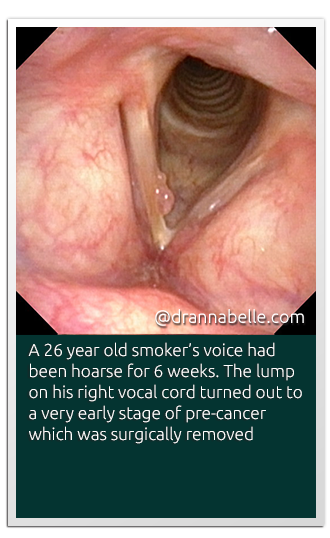Throat and Voice
Foreign Bodies in the Throat
No matter how much care we take when eating, foreign bodies such as fishbones may become lodged inside our throat and cause a lot of discomfort. In Singapore, fishbones trapped in the throat are the number one most common ENT emergency in Singapore. Common places for fishbones to become stuck in the throat include the tonsils and back of the tongue (tongue base). Interestingly, in Europe and North America, people are more likely to get pieces of food such as steak, stuck in their throat, instead of fishbones
The problem with fishbones is that they may become deeply embedded in the soft tissues of the throat, making it difficult to remove in one whole piece. Rarely, fishbones may pierce the inner lining of the throat so that a perforation (tear) results. This is much more serious as the risk of infection is much higher and can potentially spread to the chest, making the patient extremely unwell.


Hoarse Voice
Abnormal changes in a person’s voice are called hoarseness and are related to problems with the sound-producing parts (vocal cords) of the voicebox (larynx). The voice may sound strained, weak, raspy or breathy and can affect a person’s ability to work and communicate. To produce sound when speaking or singing, the vocal cords come together and vibrate in a special wave.


Any disorder that produces a lump or swelling on the vocal cords will change the quality, strength and pitch (how high or low) of the voice. This is especially important in people whose career depends on their voice, such as singers, deejays and other professional voice users.
A hoarse voice may be the result of many factors:
- Infection such as acute laryngitis which occurs typically during a cold or the flu
- Voice misuse e.g. shouting, excessive voice use
- Vocal cord lesions e.g. polyps, cysts, nodules
- Acid reflux
- Smoking
- Neurological disorders e.g. after a stroke
- Cancer of the voicebox (larynx)



Anyone who has a hoarse voice which does not get better after 2 weeks should have a thorough checkup by an experienced ENT specialist, especially if they smoke or have previously smoked.
Dr Annabelle’s tips to prevent hoarseness:
- Stop smoking (this includes passive smoking by being in a smoky environment).
- Drink plenty of water (6-8 glasses daily).
- Minimise caffeine intake (don’t drink too much coffee or tea).
- Minimise alcohol intake
- Avoid spicy foods.
- Cut down on deep fried and oily foods.
- Try to avoid over-straining your voice by not shouting or whispering.
Lump in Throat Sensation
Feeling like you have something stuck inside your throat is more common than you think. If this sensation usually eases upon swallowing while eating, then it is less likely to represent anything sinister. Some patients may refer to this symptoms as a “foreign body” sensation and it is also known as “globus pharyngeus”.

Common causes include postnasal drip of secretions from the nose flowing down onto the throat and voicebox, as well as the rise of acid secretions from the stomach and food passage to pool around the throat area. Although a lump in throat sensation usually has a benign cause, it is still best to have this checked out carefully by the ENT specialist who will perform a flexible endoscopic examination of the nose, throat and voicebox. Rarely, more worrying findings such as throat or voicebox tumours may present in this manner.


Persistent Cough
Coughing repeatedly over a prolonged period of time e.g. longer than 2 weeks, should be checked out thoroughly by both the respiratory (Chest) and ENT specialists, even if you have never smoked before in your life. Imaging in the form of a chest X ray or a CT scan of the chest should be undertaken. If there is no apparent cause in lower airways and lungs for the chronic cough, then a flexible nasoendoscopy is usually performed by the ENT specialist to examine the voicebox, throat and upper airways. Often, it may just be the lingering effects of a nasty bout of flu.


Sometimes, a postnasal drip of secretions from the nose due to allergy or infection, may fall onto and irritate the voicebox, leading to the chronic cough. Acid reflux issues from the stomach (gastro-oesophageal reflux) may also lead to the upwards flow of acid to cause inflammation of the voicebox and hence a chronic cough, which tends to be worse at night when lying down in bed. Medications are prescribed to target these sources of the chronic cough.
A chronic cough may sometimes be due to growths or lumps on the voicebox or throat. Cancerous tumours may rarely present in this manner, together with other symptoms such as hoarse voice or shortness of breath. However, most lumps on the voicebox are usually benign.

Sore Throat in Adults
The most common cause of a sore throat is usually during a bout of flu due to a viral infection (viral pharyngitis). Although most sore throats will eventually improve on their own, sometimes a course of antibiotic tablets may be required. Throat infections may make it hard to eat and drink, so sometimes, if the patient is unable to swallow properly, then he or she may have to be admitted to hospital to have fluids, antibiotics and painkillers given through an intravenous drip (into the veins instead of through the normal route by mouth).

Sore throats can sometimes be due to tonsillitis, a viral or bacterial infection of the tonsils which can be rather painful. The patient with tonsillitis may also have a high fever and may have problems swallowing. Many cases of tonsillitis however, settle down with supportive care using painkiller and antibiotics. If tonsillitis occurs on a frequent basis e.g. more than 3-4 times a year, then surgical removal of the tonsils (tonsillitis) may be advised to prevent future infection.
If the sore throat does not get better, then it is best to get it checked out thoroughly by the ENT specialist who will usually perform a flexible nasoendoscopy to carefully examine the throat and voicebox areas to rule out more worrying concerns.







